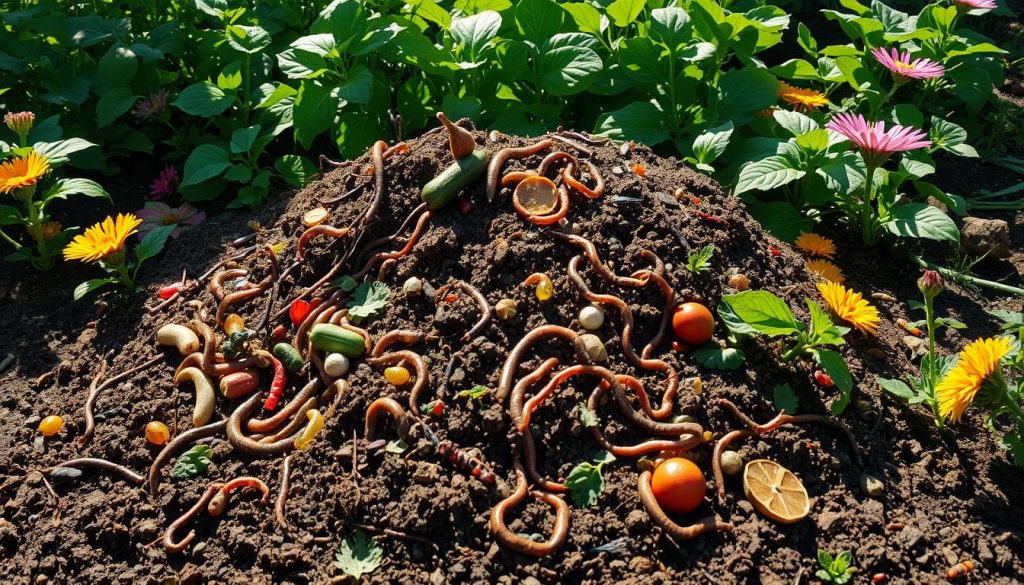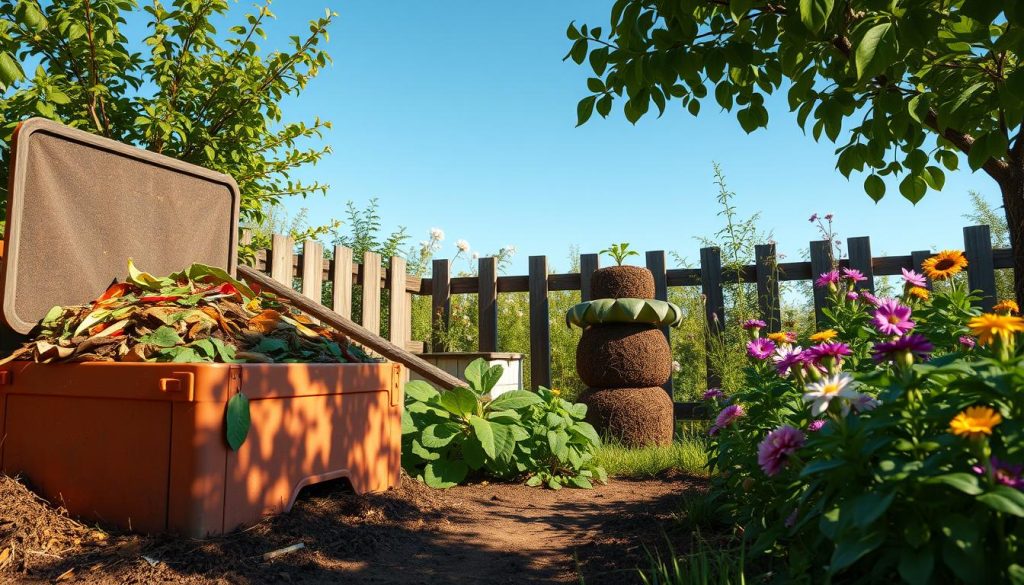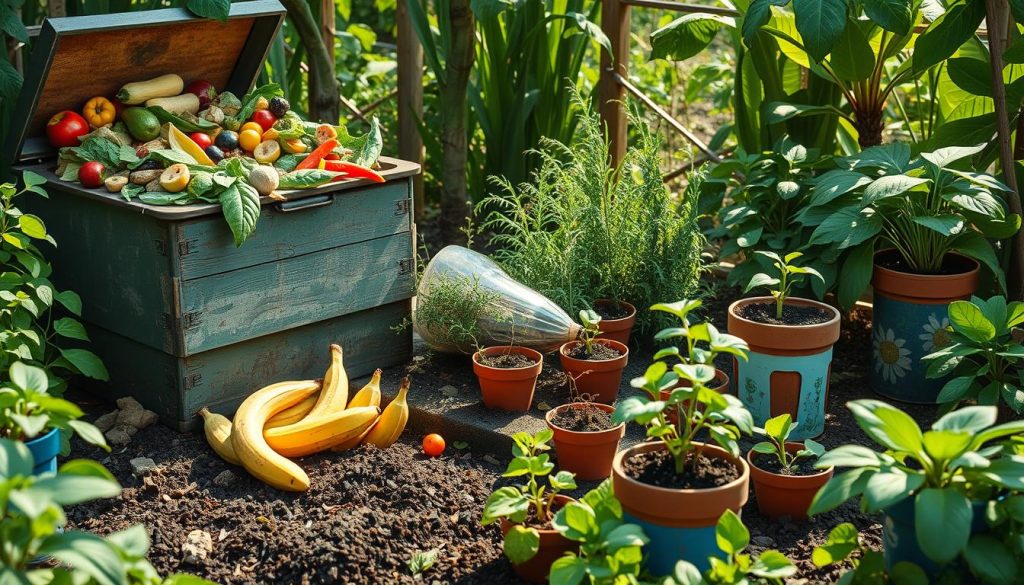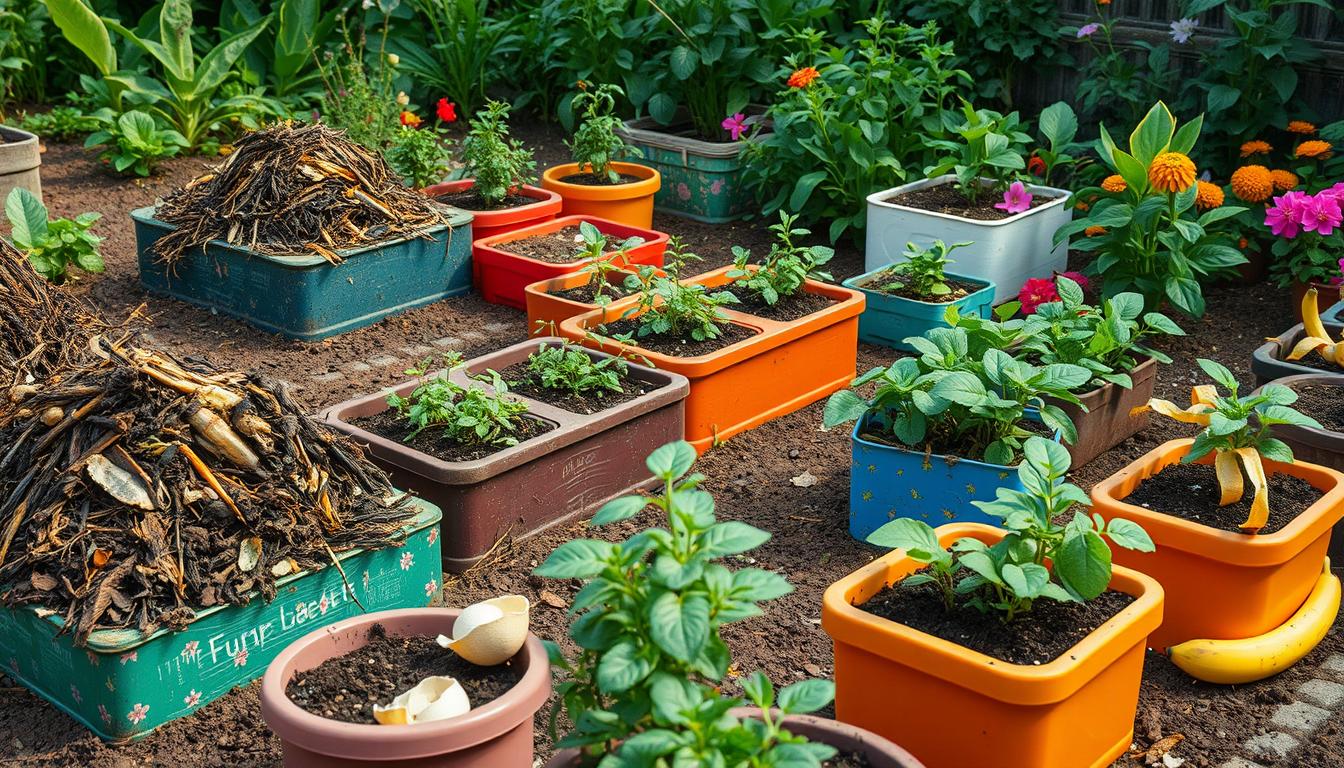As a gardener, I’m always searching for new ways to use food waste in my garden. This helps reduce waste and makes my garden more eco-friendly. By using these strategies, we can cut down on landfill waste and improve our garden’s health.
In this article, I’ll share my best tips for using food waste. We’ll cover composting and using waste as natural fertilizers. I’ll also talk about the benefits of reducing waste and share some creative gardening ideas for a greener garden.
Why Food Waste is a Goldmine for Your Garden
Exploring garden composting opens up a world of benefits for your garden. By using organic gardening tips and sustainable practices, your garden can flourish. Food waste is a treasure for your garden, helping to cut down on landfill waste and reduce harmful emissions.
Composting food waste is a simple way to make your soil rich and fertile. It’s a crucial part of gardening sustainably. Using food waste in your compost can greatly reduce your need for chemical fertilizers and waste. The benefits include:
- Improved soil structure and fertility
- Increased crop yields and healthier plants
- Reduced waste sent to landfills and minimized environmental impact
By following these tips, you can make your garden healthier and more eco-friendly. Let’s start this journey to a greener garden, exploring the advantages of composting and repurposing food waste.

Types of Food Waste I Use in My Garden
I’ve found that using food waste in my garden is good for the planet and my plants. Starting with kitchen scraps is easy. It helps me reduce waste and grow a healthy garden.
I use many food waste items like vegetable scraps, fruit peels, coffee grounds, and eggshells. They make my soil rich and healthy. This way, I cut down on landfill waste and garden more sustainably.
Vegetable Scraps
Carrot tops and potato peels are great for my compost pile or as fertilizer. They’re full of nutrients that boost soil health.
Fruit Peels
Orange and lemon peels keep pests away and attract good bugs. They also enrich my soil when added to compost.
Coffee Grounds and Eggshells
Coffee grounds and eggshells make my soil better. Coffee adds nitrogen, and eggshells give calcium, both key for plants.
Using these items in my garden has made it greener and more productive. I hope you’ll try using food waste in your garden too. It’s good for the planet and your garden.
Creative Composting Techniques for Food Waste
I’ve been exploring garden composting and found cool ways to make soil from food waste. Using organic gardening tips and sustainable practices has cut down my environmental impact. It’s also made my garden healthier. Hot composting is a top method, mixing food waste with other materials to make rich compost.
Hot composting has many benefits:
- It breaks down fast, usually in weeks
- High heat kills off bad stuff and weed seeds
- The compost is full of nutrients for plants
I’ve also tried vermicomposting with worms and bokashi composting. These methods are different ways to break down food waste. They help make my garden sustainable. Using these methods, I’ve cut down waste and made my garden ecosystem thrive.

By using these creative composting methods and organic gardening tips, you can turn food waste into something valuable for your garden. Sustainable gardening is good for the environment and helps plants grow well. It also means you use less synthetic fertilizers.
Utilizing Food Waste Directly in My Garden
I’ve found many ways to use food waste in my garden. It’s good for the planet and makes my garden healthier. Making homemade fertilizers from food scraps is a big help.
I use vegetable scraps, fruit peels, and coffee grounds to make fertilizers. These natural fertilizers help plants grow well and cut down on chemical use. It saves money and is better for the environment.
Homemade Fertilizers
- Combine vegetable scraps, fruit peels, and coffee grounds to create a nutrient-rich compost tea
- Use eggshells to add calcium to the soil and promote healthy plant growth
- Make a natural fertilizer by mixing food waste with water and letting it steep for several days

Mulching with Food Waste
Mulching with food waste helps my garden too. It keeps the soil moist, stops weeds, and keeps the temperature right. It’s a green way to garden and makes my garden strong.
Tips for Getting Started with Food Waste in the Garden
Turning your food waste into a garden is a great idea. It makes your garden healthy and helps the planet. But, it’s key to start right.
Finding a Balance
Begin by adding a little food waste to your compost or soil. Watch how your plants do and add more as you get better at it. It’s important to keep the right mix of materials for your plants to grow well.
Tools and Resources I Recommend
Get the right tools like a compost bin, garden fork, and soil pH test. They help you manage waste and check your garden’s health. Online, you can find lots of tips and advice from other gardeners.
Monitoring Results and Adjusting Techniques
Watch your garden closely and see how it reacts to the food waste. If problems come up, like pests or nutrient issues, change your approach. Test your soil often and adjust as needed to keep your garden healthy.
By starting small, trying new things, and adjusting as needed, you’ll have a thriving garden. Remember, it’s all about starting small, experimenting, and improving your gardening skills. Happy gardening!

